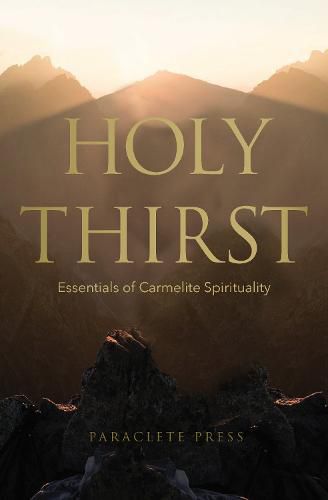Readings Newsletter
Become a Readings Member to make your shopping experience even easier.
Sign in or sign up for free!
You’re not far away from qualifying for FREE standard shipping within Australia
You’ve qualified for FREE standard shipping within Australia
The cart is loading…






This title is printed to order. This book may have been self-published. If so, we cannot guarantee the quality of the content. In the main most books will have gone through the editing process however some may not. We therefore suggest that you be aware of this before ordering this book. If in doubt check either the author or publisher’s details as we are unable to accept any returns unless they are faulty. Please contact us if you have any questions.
These saints have spoken to the hearts of millions. They’ve helped many on the way to understanding the role of God in their lives. In this collection, may their words again help all who long for a life of meaning, touched and transfigured by God.
Holy Thirst presents all the essential themes of Carmelite spirituality, excerpted from classics such as The Way of Perfection of St. Teresa of Avila, The Ascent of Mount Carmel by St. John of the Cross, The Story of a Soul of St. Therese of Lisieux, and The Practice of the Presence of God by Brother Lawrence. Also included are shorter portions by lesser known, more recent Carmelites: St. Elizabeth of the Trinity, St. Teresa Benedicta of the Cross (Edith Stein), and Sr. Miriam of the Holy Spirit (Jessica Powers).
As you hold this collection, it is important to recall the beginnings of Carmelite spirituality, a beginning that takes us back to the twelfth century and the time of the Crusades. A band of brothers-conscientious objectors, of sorts-witnessed firsthand the clash of civilizations and all that it entailed. They knew death, they knew loss, and their very souls were bruised. The only next step that they could envision was to leave the world as they knew it and settle on the sacred mountain known for centuries to Jews, Christians and Muslims as the holy home of the Prophet Elijah… -Adam Bucko, from the Foreword
$9.00 standard shipping within Australia
FREE standard shipping within Australia for orders over $100.00
Express & International shipping calculated at checkout
This title is printed to order. This book may have been self-published. If so, we cannot guarantee the quality of the content. In the main most books will have gone through the editing process however some may not. We therefore suggest that you be aware of this before ordering this book. If in doubt check either the author or publisher’s details as we are unable to accept any returns unless they are faulty. Please contact us if you have any questions.
These saints have spoken to the hearts of millions. They’ve helped many on the way to understanding the role of God in their lives. In this collection, may their words again help all who long for a life of meaning, touched and transfigured by God.
Holy Thirst presents all the essential themes of Carmelite spirituality, excerpted from classics such as The Way of Perfection of St. Teresa of Avila, The Ascent of Mount Carmel by St. John of the Cross, The Story of a Soul of St. Therese of Lisieux, and The Practice of the Presence of God by Brother Lawrence. Also included are shorter portions by lesser known, more recent Carmelites: St. Elizabeth of the Trinity, St. Teresa Benedicta of the Cross (Edith Stein), and Sr. Miriam of the Holy Spirit (Jessica Powers).
As you hold this collection, it is important to recall the beginnings of Carmelite spirituality, a beginning that takes us back to the twelfth century and the time of the Crusades. A band of brothers-conscientious objectors, of sorts-witnessed firsthand the clash of civilizations and all that it entailed. They knew death, they knew loss, and their very souls were bruised. The only next step that they could envision was to leave the world as they knew it and settle on the sacred mountain known for centuries to Jews, Christians and Muslims as the holy home of the Prophet Elijah… -Adam Bucko, from the Foreword